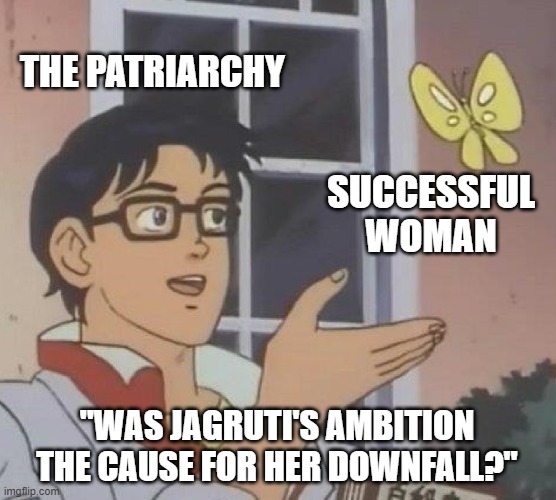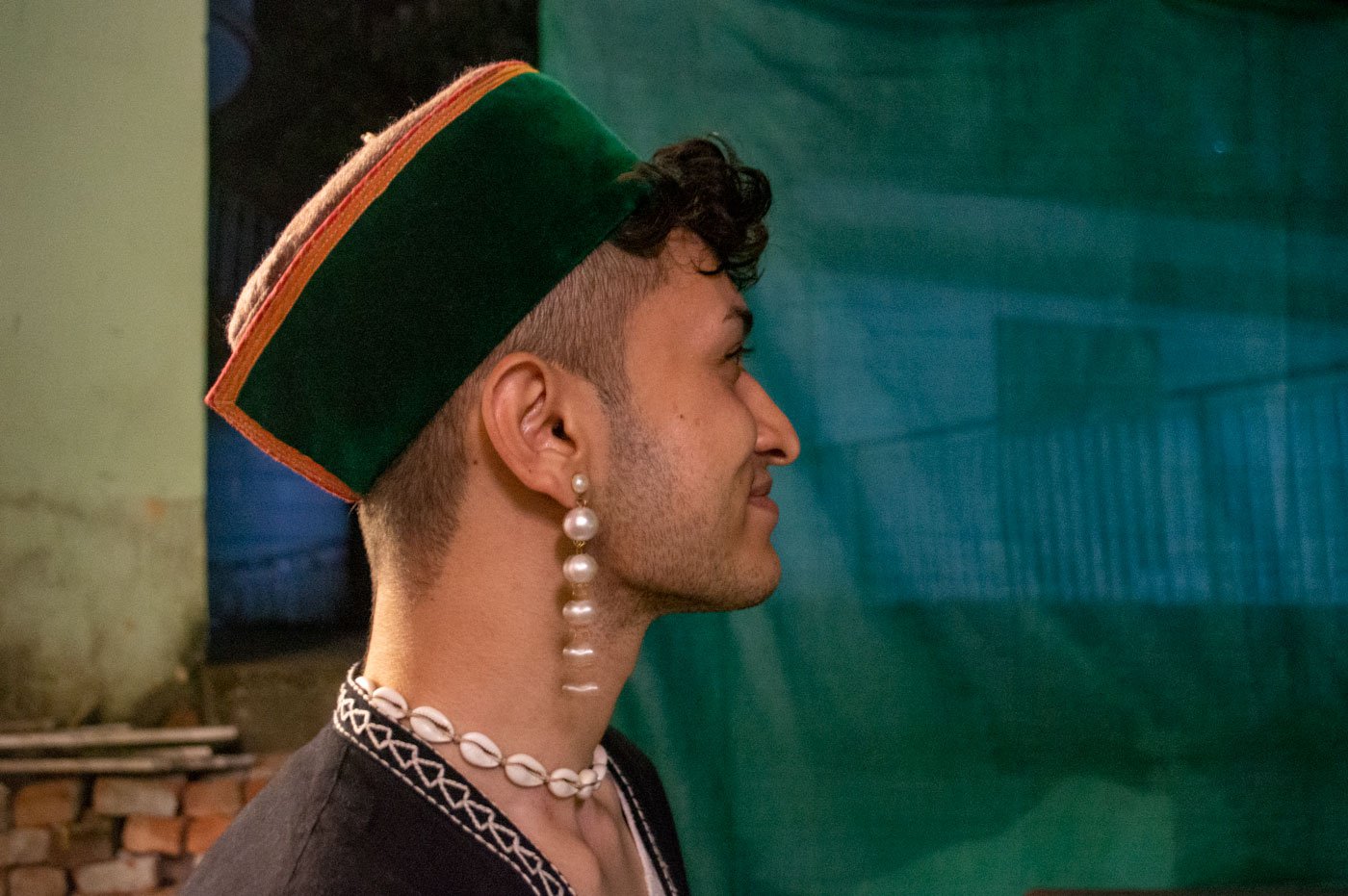She puts her career before her only child. “I’m sorry kid. I really want to come. But something’s come up at work.” The disappointed 10-year-old shoots back: “You’re working every day. You don’t like to do anything else.”

That’s the script for when Jagruti Phatak, single mom and investigative journalist, tells her son she can’t take him for the movie they had planned to watch. The TV series is Scoop on Netflix and it is based on the true story of crime reporter Jigna Vora.
Jagruti’s ambitions are pretty straightforward and include (though not necessarily in this order): To become the first woman in her family to buy an apartment, to give her son a good education and to keep getting the scoops that keep her byline on page 1.
There is much to take away from the show—the relationship between journalists and their sources, the cutthroat race for page 1, trial by media—but there is no escape from the underlying message of what ambition means for women, particularly in a field like crime reporting that is dominated by men.
Morality tale on the Ambitious Woman

(Source: Netflix)
“It was a conscious decision to comment on the very judgmental way we look at women in the workplace,” Hansal Mehta, the creator and director of Scoop tells me on the phone. “Everybody rushed to judge her [Jigna Vora] because of her gender. And she was judged not just by men but also by women.”
Jagruti/Jigna’s rise to deputy bureau chief in just seven years and her ability to land scoops leads to speculation much of which stems from jealousy. After all if a woman is doing well in her career, there must be (nudge-nudge, wink-wink) some reason other than her talent and hard work. “Was Jagruti’s ambition the cause for her downfall?” asks the Netflix promo. Can you imagine the same question being framed if she was a man?
The assumption was she had used unconventional means to get what she wanted, explains Mehta. “There were insinuations about her relationship with cops, with her sources and even her editor,” he says “It happens in every industry. It happens in my business and in corporates as well.”
Double standards
Ambition has been a pretty loaded term for women. Back in 2004, psychologist Anna Fels wrote in the Harvard Business Review that for men, ambition was considered a necessary and desirable trait whereas for women it was associated with egotism, self-aggrandisement and manipulation.
Even Barack Obama weighed in, telling a journalist in 2016: “When men are ambitious, it’s just taken for granted…when women are ambitious—why?”
“It’s like an unconscious bias where women are asked to order the lunch or pour the tea,” says Preeti Reddy, erstwhile chairwoman and CEO, Kantar Insights, South Asia. “Women still can’t openly say they are ambitious or working hard for a promotion because they feel they will be judged for it, by women as well as men.”
But biases against women persist all over the world. A newly released UN Report on gender social norms finds that nine out of 10 people, men as well as women, hold these biases.
For instance, in 80 countries, half the people believe that men make better political leaders; 40% say they are better business executives than women and a worrying 25% believe it is justified for a man to beat his wife.
The UN study comes on the heels of another report that finds that gender bias and discrimination have held women back in the workplace for generations.
Researchers of this study, a summary of which was published in Fast Company, identified 30 common personality traits women say are used against them at work. Age is the most persistent with women being told either they are too young to lead or too old.
Men did not face the same bias; a young man is hungry and ambitious; an older man is mature and experienced.
Women are criticized so often that they assume what they are hearing as truths and work even harder to make improvements.
The problem doesn’t lie with women but with attitudes to them, that they are “never quite right”, If they have kids, there’s an assumption that they won’t be able to commit to the job. If they are childless, there’s the assumption that it’s ok to dump even more work on them.
Weigh in: Is it ok for a woman to be ambitious? Does society judge ambitious women differently from ambitious men? Write to me at: namita.bhandare@gmail.com
In numbers
79% of women aged 60 and above are dependent on their children for their finances. 66% do not own any assets and 75% have no savings.
Source: A recently released Helpage survey of 7,911 respondents found that 16% of older women also faced some kind of abuse with the son being the perpetrator in 40% of cases.
The big update
Wrestlers’ protest

Brij Bhushan (Source: PTI)
On Thursday, the Delhi police finally filed a charge-sheet against Brij Bhushan Sharan Singh, the six-time BJP MP who headed the Wrestling Federation of India for 12 years.
Singh has been accused of sexual harassment by six women wrestlers. A seventh wrestler, a minor at the time she says she was molested by Singh, has withdrawn her statement. Her father has spoken about receiving threats, but has not named the source of these threats.
Singh is off the hook on POCSO, India’s stringent protection of children from sexual offences law that would have meant automatic jail for him. He is now accused of a variety of lesser charges such as outraging the modesty of women. The maximum jail term under these charges is five years, should he be found guilty.
Rio Olympics bronze medallist Sakshee Mallik told HT that she was disappointed but for now the wrestlers have put their protest on hold.
[Read also,the minor wrestler’s father tells a story riddled with contradictions.]
See

(Source: PARI)
There’s a lovely photo feature in PARI (People’s Archive of Rural India) on the first Pride March held at Dharamsala, Himachal Pradesh. With participants from villages and small towns in the state, the march was the first ever public gathering in support of the LGBTQI+ community.
See the pictures in PARI here.
Can’t make this up
Eight days ago Justice Samir Dave of the Gujarat high court advised a minor rape victim who was seeking the court’s permission to abort the foetus born out of that rape to read the Manusmriti and lectured her on how in previous generations, girls were married off by 14 and became mothers by 16. But that’s not all. This week, the good judge asked for the man accused of raping the girl to be produced in court so that he could find out what “compromise” was possible with the girl he had raped. Turns out the man is already married. So, no “compromise”.
The girl’s advocate has told the court that the family of daily wage labourers is not willing to keep the baby. The judge has said he will not allow an abortion at this stage. Legally, abortions are permissable only until 24 weeks but the courts have made exceptions, the most recent of which was in January this year when the Bombay high court allowed it at 33 weeks.
What’s making news
Interfaith couples can breathe a sigh of relief, in Karnataka at least
Keeping its campaign promise, the Congress government in Karnataka has announced it will be repealing the state’s Right to Freedom of Religion act enacted by the earlier BJP government in 2022.
As in nine other BJP-ruled states, the law adds to the already existing prohibition on religious conversion through misrepresentation and fraud by including marriage. It carries a punishment of up to 10 years in jail, making it hard for interfaith couples to marry. In Uttarakhand, for instance, interfaith couples who intend to marry through conversion must have the permission of a magistrate at least a month before.
The law is premised on the unproven theory that gullible Hindu women can be entrapped into marriage by wily Muslim men with the sole purpose of getting them to convert. The Congress had called the law anti-Constitution and anti-minority.
But in BJP-ruled Uttarakhand all interfaith marriages since 2018 will be scrutinised by the state police.
UCC redux
With the general elections barely a year away, talk of a Uniform Civil Code has popped up again with the 22nd Law Commission inviting religious organisations and the general public to send in their views. The commission is headed by Ritu Raj Awasthi who, as former Karnataka high court chief justice, had upheld the hijab ban in the state.
At present, citizens follow their respective personal, religious laws in matters concerning inheritance, adoption, marriage, divorce and maintenance. The BJP had promised to bring in a UCC in its 2019 manifesto. In October 2022, the central government had told the Supreme Court that the Constitution obliged the State to have a uniform civil code for all.
[I had written about the implications of a UCC in an earlier newsletter here]
Big breaking
Former Tamil Nadu special director general of police, Rajesh Das has been convicted and sentenced to three years’ imprisonment for sexually harassing a woman superintendent of police while on duty in February 2021. Divya Chandrababu has the details.
…And the good news

Source: Karnataka CM Siddaramaiah’s Twitter Handle
Coming out of Karnataka again, the Congress government has kept another poll promise, this one of free bus rides to all women passengers. Women’s mobility, or lack of it, has long been understood to be a key to their more equal participation in society. A “pink ridership” scheme introduced by the Aam Aadmi Party in New Delhi for the first time anywhere in India in October 2019 has seen 118 crore rides (till May 2023).
AROUND THE WORLD
In New Orleans, the annual meeting of the Southern Baptist Convention, America’s largest Protestant denomination with 13.2 m adherents, expelled five churches over the appointment of women as pastors. But things were not always so doctrinaire, reports The Economist.
In Santiago, Chile, Nos Buscamos, a small non-profit, is trying to help thousands of Chileans who were illegally adopted during the Pinochet regime to find their biological families. Rest of the World has the story.
In Japan, law-makers have cleared a bill to raise the age of consent from 13, amongst the lowest in the world, to 16. The bill also clarifies rape prosecution requirements and criminalises voyeurism. The age of consent in other countries varies from 14 in Germany and China to 18 in India. Ambika Pandit of the Times of India has a story on the Law Commission exploring possibilities of lowering the age back to 16 as it was to avoid the spate of mandatory rape charges being slapped on consenting couples.